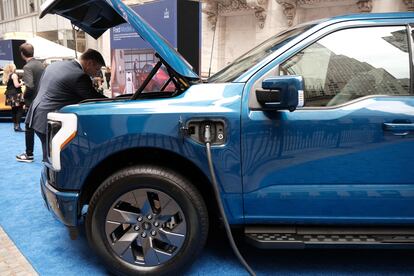Auto dealers up campaign urging Biden administration to halt EPA tailpipe emission limits regulation
The Environmental Protection Agency says its proposal would require up to two out of every three vehicles sold in the U.S. to be electric by 2032

More than 4,700 auto dealerships across the United States urged President Joe Biden in a letter Thursday to halt the Environmental Protection Agency’s efforts to enforce stricter vehicle-pollution standards.
The missive comes just weeks before the agency’s expected ruling on its tailpipe-emissions proposal, which addresses both climate change and pollutants that are harmful to health.
It is the second letter that auto dealers have sent to the White House in two months on the EPA’s upcoming ruling, which could codify the agency’s strictest-ever tailpipe emissions limits, proposed last April. The dealerships said Thursday that the Biden administration did not respond to their first letter sent on Nov. 28. The agency and administration did not return request for comment.
With the world focused on trying to limit warming to no more than 1.5-degree Celsius temperature above pre-industrial times, the administration has an ambitious goal to cut domestic planet-warming greenhouse gas emissions in half by 2030. Part of its focus is on the transportation sector, 58% of the emissions from which come from passenger cars and trucks, according to the EPA. The regulation also limits hydrocarbons, nitrogen oxides, and particulate matter into the air. These emissions cause a host of health issues and disproportionately affect people who live near heavy traffic.
The EPA says its proposed regulations would require up to two out of every three vehicles sold in the U.S. to be electric by 2032. That’s higher than the administration’s target of 50% set two years ago.
The regulations, which impact light- and medium-duty vehicles beginning with the 2027 model year, could mean a 56% drop in projected greenhouse gas emissions from the fleet, relative to existing standards, avoiding nearly 7.3 billion metric tons of carbon dioxide emissions by 2055. They also reduce pollutants harmful to health by 60% from the existing standard by model year 2032.
Most automakers around the globe have pledged hundreds of billions of dollars to transition to all-electric new vehicle sales in the coming decade as momentum to address climate change builds. Last year, U.S. EV sales overall grew 47% to a record 1.2 million, according to Motorintelligence.com. EVs are seeing year-over-year growth, but only hit 7.6% of overall market share in 2023. Given that, thousands of auto dealers say they won’t be able to meet the EPA’s stringent goals.
Nearly 4,000 dealerships of the nearly 17,000 franchised shops nationwide asked Biden to “tap the brakes” on the EPA proposal in the November letter, referring to the rules as an “electric vehicle mandate.” House Republicans approved a bill in December to block the pollution limits and also called the rules a mandate.
In this week’s letter, the dealerships asked Biden to “hit the brakes” entirely, citing several factors that they say indicate slowing EV adoption. The signers said the supply of EVs on dealer lots is twice that of internal combustion engine vehicles, and that they won’t be able to sell EVs at the rate the regulations would require.
“It is uncontestable that the combination of fewer tax incentives, a woefully inadequate charging infrastructure, and insufficient consumer demand makes the proposed electric vehicle mandate completely unrealistic,” the letter says.
The EPA’s tailpipe-pollution limits wouldn’t require automakers to sell a specific number of EVs every year.
Automakers can meet EPA regulations not just through pure-electric vehicle sales, but also through a sales mix including hybrid and plug-in hybrid electric vehicles. The EPA has also said that the auto industry could employ widespread use of particulate filters, which mitigate the soot emitted from internal-combustion engines.
The EPA is also proposing regulations for medium- and heavy-duty trucks, and the government’s National Highway Traffic Safety Administration has separately proposed a fuel-economy increase.
Sign up for our weekly newsletter to get more English-language news coverage from EL PAÍS USA Edition
Tu suscripción se está usando en otro dispositivo
¿Quieres añadir otro usuario a tu suscripción?
Si continúas leyendo en este dispositivo, no se podrá leer en el otro.
FlechaTu suscripción se está usando en otro dispositivo y solo puedes acceder a EL PAÍS desde un dispositivo a la vez.
Si quieres compartir tu cuenta, cambia tu suscripción a la modalidad Premium, así podrás añadir otro usuario. Cada uno accederá con su propia cuenta de email, lo que os permitirá personalizar vuestra experiencia en EL PAÍS.
¿Tienes una suscripción de empresa? Accede aquí para contratar más cuentas.
En el caso de no saber quién está usando tu cuenta, te recomendamos cambiar tu contraseña aquí.
Si decides continuar compartiendo tu cuenta, este mensaje se mostrará en tu dispositivo y en el de la otra persona que está usando tu cuenta de forma indefinida, afectando a tu experiencia de lectura. Puedes consultar aquí los términos y condiciones de la suscripción digital.








































